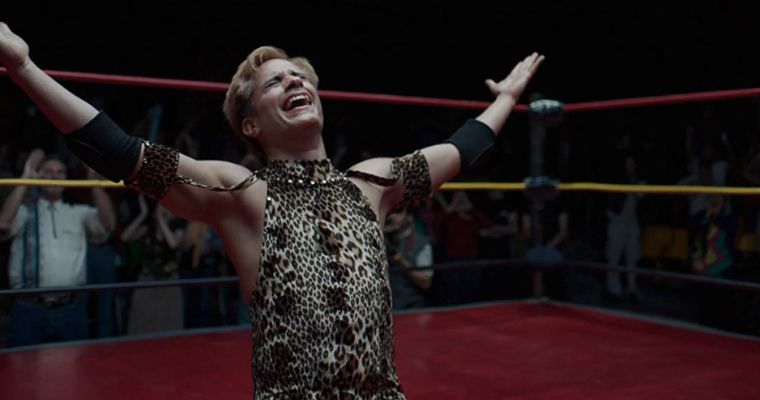
Gael Garcia Bernal as Saul Armendariz/Cassandro in a scene from "Cassandro." (Photo courtesy of Amazon Prime Video)
It's the middle of September, but at least at the movies, it doesn't quite feel like it. Long considered a dumping ground for bad movies along with January, this is the time of year when moviegoers (and some critics) may choose to take a breather in anticipation of awards season.
It's different this year. There is a lot to look forward to before the month is over. This week, let's focus on a double dose of Mexican-American stories that are nothing less than a breath of fresh air. One is taken from real life and the other adapts a celebrated young adult novel. Both are at least partly set in the late 1980s and feature El Paso prominently. The characters in these films may not have everything figured out, but even though they may feel they're not quite ready for prime time, there's little doubt that they're ready for their closeup, Mr. DeMille.
“Cassandro”: Gael García Bernal finds a showcase worthy of his captivating screen presence in this galvanizing, big-hearted portrait of real-life lucha libre icon Saúl Armendáriz, better known by the fabulous wrestling ring persona that gives director/co-screenwriter Roger Ross Williams' biopic its name.
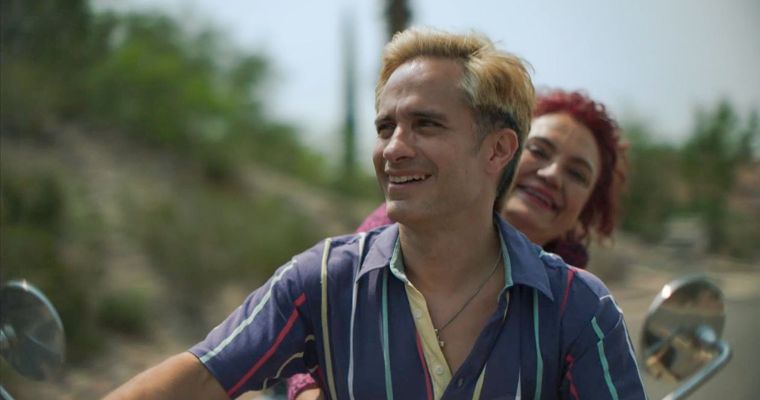
Gael Garcia Bernal as Saul Armendariz/Cassandro and Perla de la Rosa as Yocasta in a scene from "Cassandro." (Photo courtesy of Amazon Prime Video)
The film doesn't give viewers a particular year as a signpost, but all the telltale trappings of the late '80s and early '90s are in place. In this telling of events, Saúl frequently crosses the border from his native El Paso to Ciudad Juárez to fight other masked luchadores as “El Topo.” He yearns to give spectators a show like his idol El Santo, but this Chihuahua venue is strictly small-time.
Of course, not all luchadores wear masks. The gender-bending exóticos take on their macho opponents to the sound of jeers and homophobic jabs by the public. In this thoroughly scripted setting, the exóticos always lose. Ah, but when they look so divine landing laughs and perhaps a few cheers, they look like winners.
The idea forms in his head that maybe it's time for a change of pace: an exótico who is also a mighty contender in the ring. Back home, his mother Yocasta (Perla de la Rosa) has her doubts about her son's desire to pursue this more unorthodox career path, as well as concerns for his safety, a sobering reminder of anti-LGBTQ+ violence that was less condemned then than it is now. Fortunately, Williams, who co-wrote the screenplay with David Teague, sidesteps the victimization route, avoiding the showbiz clichés that these stories tend to gravitate toward, much to the film's benefit.
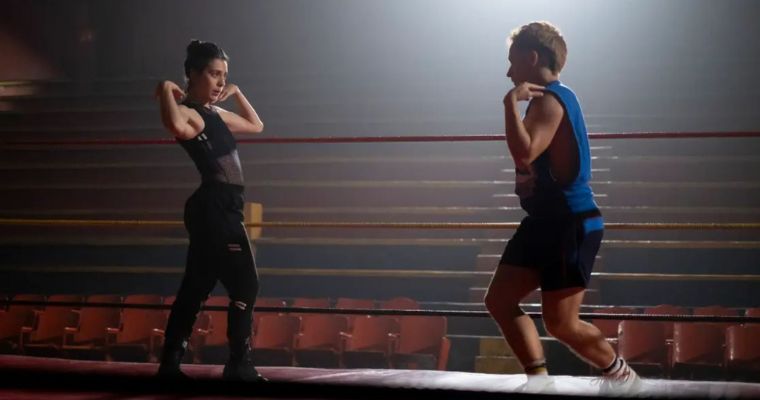
Roberta Colindrez as Sabrina and Gael Garcia Bernal as Saul Armendariz/Cassandro in a scene from "Cassandro." Photo courtesy of Amazon Prime Video.
Saúl seeks out Sabrina (Roberta Colindrez from the Starz series “Vida”), known on the lucha libre circuit as “Lady Anarquía,” who agrees to train him after a brief, satisying tussle in the ring. That scene, like most of “Cassandro,” illustrates the economy of storytelling that Williams, an Oscar-winning documentarian, brings to the table. What he delivers is a perceptive and honest character study disguised as a sports movie. The filmmaker uses the mold of the underdog narrative as the backdrop to showcase his gift for portraiture. Every step that Saúl takes in making a name for himself, as he evolves from an amateur into a pro, is informed by his quest for self-discovery, so his rise to fame feels organic.
Williams also incorporates elements from the telenovela and classic melodrama in his depiction of Saúl's relationship with his mother, who still yearns for her son's biological father, and in his affair with fellow luchador Gerardo (hunky Raúl Castillo continues to impress), aka “El Comandante,” who is married with kids. Again, Williams finds a way to depict these relationships as lived-in and natural. Viewers expecting some of the overheated passions of a Mexican soap opera might be surprised by “Cassandro's” restraint.
What Williams does retain is the aspect ratio of those TV programs. Argentinean cinematographer Matias Penachino takes full advantage of the 4:3 frame; his boxy compositions are splendid, and they make the skillfully staged matches vividly come to life. Another highlight is a memorable score by composer Marcelo Zarvos (the Showtime series “The Affair”)
.
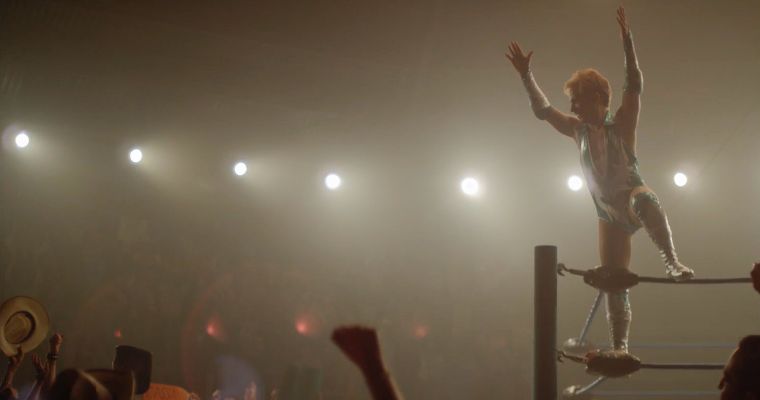
Gael Garcia Bernal as Saul Armendariz/Cassandro in a scene from "Cassandro." (Photo courtesy of Amazon Prime Video)
If one were to find fault with “Cassandro,” is that it builds toward a big Mexico City encounter, filled with iconic and awe-inspiring imagery, and from there, the rest of the movie feels rather anticlimactic. The film also features Puerto Rican rapper Bad Bunny, appearing under his real name Benito Antonio Martínez Ocasio, in a fairly minor role, but when compared to the caliber of the rest of the performances, the music star just doesn't measure up. His fans will likely eat up what amounts to an extended cameo.
But in the end, these are minor quibbles about a feature-length celebration of perseverance and queer visibility that gives its star the opportunity to give his best performance in years. García Bernal's unassuming, no-nonsense approach to playing Saúl is the secret sauce in this story about a life lived out in the open. It punches above its weight.
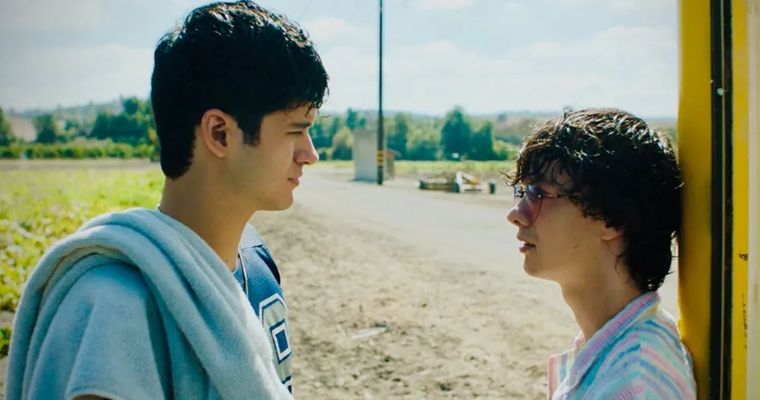
Max Pelayo as Aristotle Mendoza and Reese Gonzales as Dante Quintana in a scene from "Aristotle and Dante Discover the Secrets of the Universe." (Photo courtesy of Blue Fox Entertainment)
“Aristotle and Dante Discover the Secrets of the Universe”: It's a mouthful of a title, but this screen adaptation of Benjamin Alire Sáenz's 2012 YA book is a modestly scaled charmer that's more than the sum of its parts. Directed by Miami filmmaker Aitch Alberto, the Blue Fox Entertainment release depicts the friendship that blooms between two Mexican-American boys in El Paso circa 1987.
The film is told entirely from the point of view of Aristotle Mendoza (Max Pelayo), a loner who has reached that point in adolescence where he's on such a different wavelength from his parents, they may as well live on different planets. Family matriarch Liliana (Veronica Falcón, so good in HBO's “Perry Mason”) holds this working-class household together, because her husband Jaime (that's Eugenio Derbez under a mane of white hair) is reserved and stoic, a man of few words, and even fewer when it comes to Aristotle's older brother, who is behind bars for a crime that remains shrouded in secrecy.
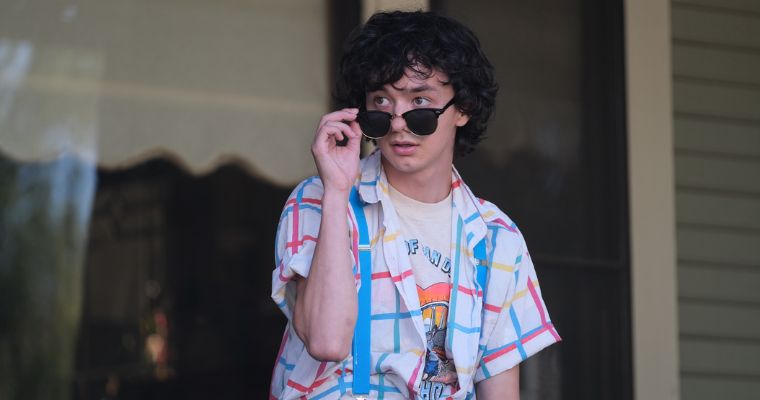
Reese Gonzales as Dante Quintana in a scene from "Aristotle and Dante Discover the Secrets of the Universe." (Photo courtesy of Blue Fox Entertainment)
Aristotle spells out his angst in abundant, only occasionally intrusive voiceover narration, admitting that he shares his father's emotional incontinence. Thus, it's up to Dante Quintana (Reese Gonzales), whom “Ari” meets at a public swimming pool on a hot summer day, to gently coax his newfound friend out of his shell. Dante, more confident and sure of himself, offers to teach Aristotle how to swim, and in true YA fashion, the parallel between losing the fear of water and becoming more mature are etched in broad, effective strokes.
“Aristotle and Dante” follows a tried-and-true recipe, as the boys bond, then are separated when Dante leaves Texas to spend a year in the Midwest. But what sets their story apart from the YA pack is the film's exploration of what it means to be a “pocho,” a typically pejorative slang for Mexican American, and the identity crisis it can cause to those who feel neither here (U.S.) nor there (Mexico).
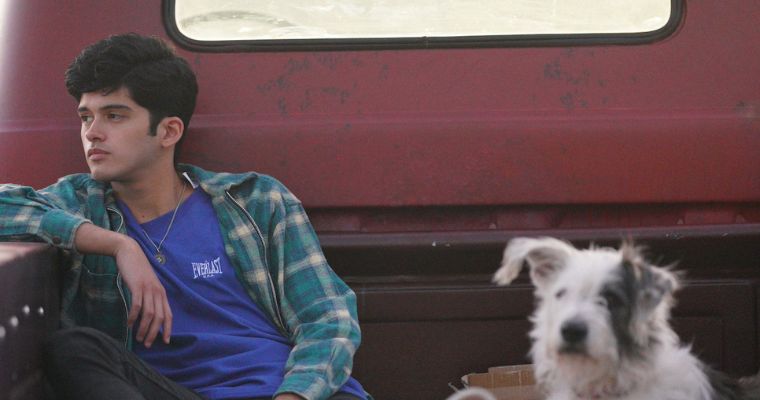
Max Pelayo as Aristotle Mendoza in a scene from "Aristotle and Dante Discover the Secrets of the Universe." (Photo courtesy of Blue Fox Entertainment)
The film gradually complicates matters as the boys exchange letters while they're apart. The missives begin with small talk and trivial stuff, before Dante turns things up a notch by revealing he's attracted to other boys. The ball's in Ari's court, but the teen, who pursues a girl who appears to be interested in him, is taken aback by his friend's revelation. As to how their friendship will evolve from there, Alberto, who also wrote the film's screenplay, initially tries to keep viewers guessing, but it doesn't take an expert to solve this puzzle. The outcome is written in the stars, literally.
A camping trip with Dante's progressive, bougie parents, well played by Eva Longoria and Kevin Alejandro, introduces “Ari” to the wonders of the night sky, triggering memories of another YA novel-turned-film, “The Fault in Our Stars,” and giving “Aristotle and Dante” its most delicate and beguiling visual motif.
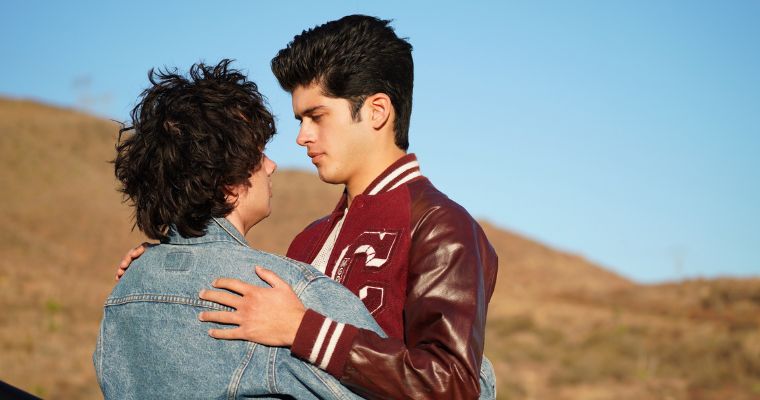
Reese Gonzales as Dante Quintana and Max Pelayo as Aristotle Mendoza in a scene from "Aristotle and Dante Discover the Secrets of the Universe." (Photo courtesy of Blue Fox Entertainment)
Some of the YA plotting eventually rears its unwelcome head, and it's safe to say it doesn't always work in the movie's favor. Alberto could have also handled the physical dangers the characters face with a little more finesse. What makes her film come alive, in addition to the easygoing chemistry between her leads, lies in how the little details make its depiction of the time period ring true: the tube socks, the digital alarm clock. But unlike, say, “Stranger Things,” Alberto doesn't hit viewers over the head with eighties nostalgia. She has crafted a sweet, disarmingly tender coming-of-age tale, one that believes opposites not only attract but also bring out the best in each other. It gives your heart a warm squeeze.
“Cassandro” is showing at The Landmark at Merrick Park in Coral Gables through this coming Thursday, then becomes available to stream on Amazon Prime Video on Friday, Sept. 22. Sadly, “Aristotle and Dante Discover the Secrets of the Universe” has ended its theatrical run in South Florida after just one week of release, but look for it on digital rental and various streaming platforms in the near future.




